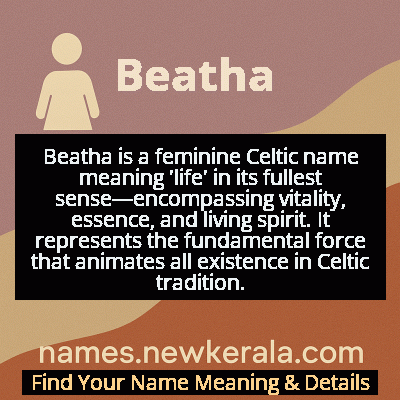Beatha Name Meaning & Details
Origin, Popularity, Numerology Analysis & Name Meaning of Beatha
Discover the origin, meaning, and cultural significance of the name BEATHA. Delve into its historical roots and explore the lasting impact it has had on communities and traditions.
Name
Beatha
Gender
Female
Origin
Celtic
Lucky Number
1
Meaning of the Name - Beatha
Beatha is a feminine Celtic name meaning 'life' in its fullest sense—encompassing vitality, essence, and living spirit. It represents the fundamental force that animates all existence in Celtic tradition.
Beatha - Complete Numerology Analysis
Your Numerology Number
Based on Pythagorean Numerology System
Ruling Planet
Sun
Positive Nature
Leaders, ambitious, highly driven, self-reliant, innovative.
Negative Traits
Overly aggressive, domineering, impatient, selfish.
Lucky Colours
Red, orange, gold.
Lucky Days
Sunday.
Lucky Stones
Ruby, garnet.
Harmony Numbers
2, 3, 9.
Best Suited Professions
Entrepreneurs, managers, engineers.
What People Like About You
Courage, determination, leadership.
Famous People Named Beatha
Beatha of Ireland
Medieval Abbess
Founded a monastic settlement in County Kerry and was known for her healing abilities
Beatha MacCarthy
Gaelic Poet
Preserved traditional Irish poetry and oral histories during the Penal Laws period
Beatha O'Malley
Cultural Preservationist
Documented and revived traditional Celtic music and dance forms in Scotland
Name Variations & International Equivalents
Click on blue names to explore their detailed meanings. Gray names with will be available soon.
Cultural & Historical Significance
During the Celtic Revival of the 19th and 20th centuries, Beatha experienced renewed interest as part of the movement to reclaim Gaelic cultural heritage. The name represents not just biological life but the Celtic concept of 'anam' or soul-life, reflecting the interconnectedness of all living things in traditional Celtic cosmology. This spiritual dimension made the name particularly significant in communities maintaining traditional practices.
Extended Personality Analysis
Women named Beatha are often perceived as having vibrant, life-affirming personalities characterized by resilience and emotional depth. They typically exhibit strong nurturing instincts and a natural ability to support others through difficult times, embodying the name's meaning of 'life' in their capacity to revive spirits and inspire growth. These individuals often possess an intuitive understanding of natural cycles and demonstrate remarkable adaptability to change.
Their presence tends to be calming yet energizing, with a grounded wisdom that comes from appreciating both the fragility and strength inherent in living beings. Beathas are frequently drawn to healing professions, creative arts, or environmental work where they can express their innate connection to life's fundamental processes. The name suggests someone who embraces change as part of life's natural rhythm and who finds meaning in fostering growth and renewal in others.
Modern Usage & Popularity
In contemporary times, Beatha remains a relatively rare but cherished name, primarily used in Gaelic-speaking communities and by families with Celtic heritage seeking to honor their roots. The name has seen a modest increase in usage since the 1990s as part of the broader Celtic names revival movement, though it remains outside the top 1000 names in most English-speaking countries. Modern Beathas often go by 'Bea' as a nickname, making the name more accessible in multicultural settings. The name is particularly popular in Scotland, Ireland, and among diaspora communities in North America and Australia who value its deep cultural resonance and connection to nature-based spirituality.
Symbolic & Spiritual Meanings
Symbolically, Beatha represents the eternal cycle of life, death, and rebirth that was central to Celtic spirituality. The name carries connotations of vitality, renewal, and the sacred interconnectedness of all living things. In metaphorical terms, Beatha symbolizes resilience—the ability to endure hardship and emerge stronger, much like nature's capacity for regeneration. It also represents the life force that animates both the physical world and spiritual realms, bridging the gap between mortal existence and eternal essence. The name evokes images of flowing water, growing plants, and the changing seasons, all fundamental symbols in Celtic tradition that reflect the continuous flow of life energy through the universe.

